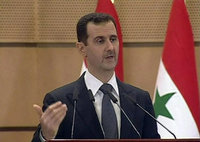NATO needs to remove Assad rather than Gaddafi
The Western political elite is increasing pressure on Syria and its allies, forcing the latter to abandon the support for the regime of Bashar Assad. The EU is prepared to adopt new sanctions against Damascus. Syrian authorities have been accused of massive human rights abuses and brutal suppression of the opposition protests. Now the EU and the U.S. are forced to actively introduce international sanctions against Syria.

How far is the West willing to go to support the Syrian opposition? A renowned political scientist, expert at the German Council on Foreign Relations, Alexander Rahr, answered this and other questions in an interview with Pravda.ru.
"It is clear that a triumph of liberalism could not be proved by a liquidation of Gaddafi alone. Now Syria is next in line, and therefore the pressure on it will not be lighter than it was on Libya. For the West, the democratization of Syria is even more important and welcomed moment than the overthrow of Gaddafi and his regime, and after their elimination the focus of the EU will switch to al-Assad. It is therefore obvious that the West's actions against Syria will be very tough and similar to those we saw in Libya."
"What caused such a reaction?"
"The West cannot ignore not only the Iranian orientation of the regime of Bashar Assad, but also the security of Israel suffering from the activity of various extremist movements. This alone is sufficient to explain the importance of democratization of Syria."
"The West insists on the "brutal suppression of mass protests in Syria." Why, then, it does not notice the harsh repression of Arab revolutions in Bahrain and Yemen? Isn't this a case of double standards?"
"Neither the U.S. nor the EU want to strengthen Iran. After all, the fall of the existing regimes in these countries will be beneficial only for Tehran. All this, of course, raises certain questions. However, in contrast to Tunisia and Egypt, the regimes in Bahrain and Yemen in particular are surprisingly strong."
"Does the West understand what kind of the opposition it is supporting and who is to replace Bashar Assad? Why do they not notice what the leaders of the Syrian "opposition" are like, for example, Sheikh Arura, whose motto is "Alawites to the grave, Christians to Beirut?"
"The problem is that not everyone in the West really understands the threat posed by these movements, and the degree of their extremism. Of course, the Islamists have not gone away, and they are preparing to use the fruits of the overthrow of the dictatorial regimes in their own way. But such details about the actions of Syrian Islamists in the West are not broadcasted. Of course, this information can be found in the dialogues of some few specialists on the Arab East, but, unfortunately, such data tend not to become public.
Negative aspects in general tend to go unnoticed, especially if they have to do with various attempts to establish Sharia law. It is believed that all the revolutions are those of the young people who deposed the hated regimes to build a new life of freedom."
"But in the case of overthrow of Assad and Islamists getting into office the interests of the West and Israel will suffer in the end."
"Do not assume that nobody is aware of the dangers they pose. In this sense, there are already certain structures and foundations. Of course, the West knows of the existence of such apparently anti-democratic forces like "the Muslim Brotherhood," and intends to do everything possible to isolate them. Now a dialogue is conducted with them to ensure that they make their tone more peaceful. To a certain extent there are visible successes in this direction. It is no accident that Egyptian "Muslim Brothers" have markedly calmed down. Brussels and Washington are going to keep the process under control and prevent any uncontrolled reaction."
"What kind of Syria the West ultimately wants to see? Some Arab television channels spread the map of "Syria without Assad" with smaller states.
"Much has been said about democracy and Assad's departure. In any case, both Brussels and Washington fear a repetition of the scenario of the Iraq war. This should not be allowed in any case. Then, the West made a serious miscalculation with Iraq. Was it really impossible to predict that with the fall of Saddam Hussein, who ensured the order, the Sunni Arabs, Shia Arabs and Kurds would not want to live with each other under the old state? The collapse of Syria as a single state is not favorable. But the emergence of these maps talks about the threat of recurrence of the Iraqi scenario.
The situation in Syria, as well as in other Arab countries, is fragile, and the West, pursuing its policy in these countries, cannot ignore this. A common mistake of the Europeans and Americans in their actions with respect to the Arab countries is the fact what they treat them as mono-ethnic states inhabited by one nation.
But this is wrong when we talk about most of these countries. The West sometimes conducts its politics absolutely without taking into account national and cultural specificities of a particular state. When putting human rights and democracy in the first place, very often millennia of tradition are ignored."
Sergei Balmasov
Pravda.Ru
Subscribe to Pravda.Ru Telegram channel, Facebook, RSS!





